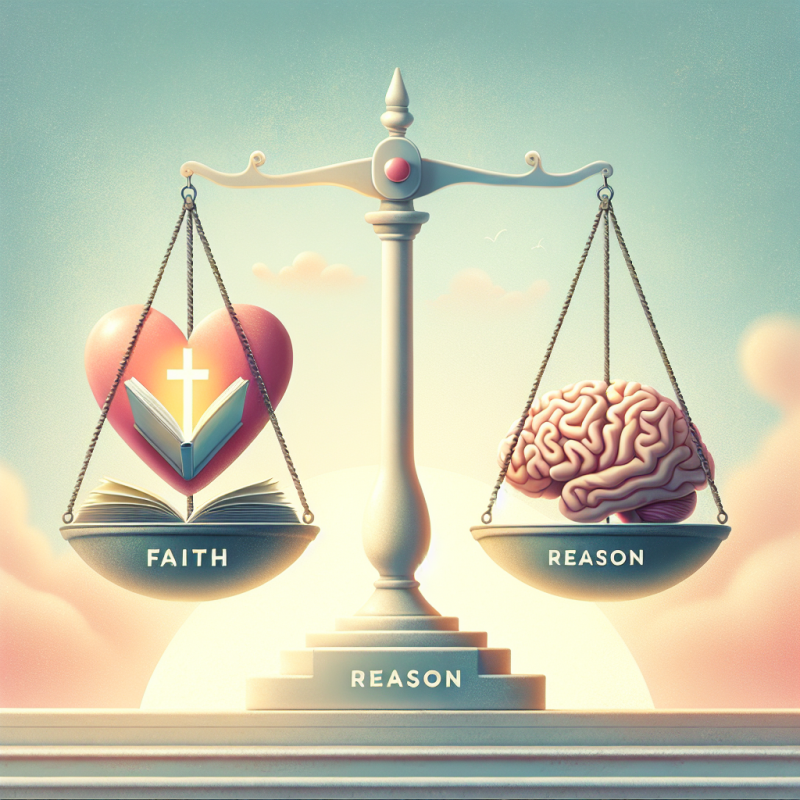The Enduring Relationship Between Faith and Reason
Throughout history, faith and reason have been perceived as opposing forces, with faith often associated with spiritual belief and reason with intellectual inquiry. However, far from being mutually exclusive, faith and reason are deeply intertwined, guiding the human pursuit of truth and understanding. This article explores the intricate relationship between these two concepts and how they can harmoniously coexist in a world that increasingly demands empirical evidence for belief.
Faith and Reason: Complementary Paths to Truth
The belief that faith and reason exist in opposition stems from a misunderstanding of both. Faith is frequently viewed as a leap in the dark, an acceptance of religious doctrine without evidence. Conversely, reason is seen as the objective process of logical thinking, a path that leads away from faith. This division, however, is misleading.
Rather than being at odds, faith and reason complement one another. Faith provides the framework through which we interpret the world, while reason allows us to explore, question, and refine our understanding. Many of the greatest theologians and philosophers throughout history, from Thomas Aquinas to C.S. Lewis, have argued that reason is necessary to make sense of faith and that faith provides purpose to reason.
Image: [1, Faith and reason philosophical debate]
Faith in the Age of Skepticism
In a world dominated by scientific discovery and empirical evidence, faith is often relegated to the realm of personal belief rather than considered a means of real knowledge. Atheistic and skeptical perspectives argue that anything that cannot be empirically proven should be treated with doubt, leading many to question whether faith has any place in an intellectual society.
However, such skepticism does not fully account for the subjective and existential dimensions of human experience. Science can explain how the world functions, but it falls short of answering the deeper questions of meaning, purpose, and morality—questions that faith seeks to address. Indeed, some of the most renowned scientists, including Isaac Newton and Albert Einstein, recognized the limitations of reason alone and acknowledged the necessity of a higher order of understanding.
The discussion of faith within an intellectual framework is not about abandoning logic but rather embracing a broader perspective. Faith allows space for awe, mystery, and divine revelation, enhancing our pursuit of knowledge rather than detracting from it.
Image: [2, Books on faith and science side by side]
The Role of Reason in Strengthening Faith
Faith, when devoid of reason, can become blind belief, unchallenged and stagnant. However, when faith is engaged with reason, it becomes more robust, resilient, and intellectually satisfying. The great theological traditions emphasize that faith must continually be examined and refined through study, debate, and critical thinking.
A rational approach to faith does not mean it becomes purely academic. Instead, it means that belief is not accepted uncritically but is tested and strengthened through experience, reflection, and discourse. When questions arise about one’s beliefs—as they inevitably do—it is reason that allows faith to be deepened rather than abandoned.
The early Church Fathers and Christian philosophers understood this balance well. They engaged with the philosophical traditions of their time, blending faith with reason to form a more comprehensive understanding of truth. Their writings continue to inspire modern theologians and believers, demonstrating that an intellectually engaged faith is not a contradiction but a necessity.
Image: [3, Historical Christian philosophers discussing theology]
Conclusion: A Lifelong Journey Toward Truth
As explored in previous articles—such as Faith and Reason: A Harmonious Path to Truth and The Harmony of Faith and Logic: Bridging the Gap—faith and reason are not rivals but allies in the pursuit of understanding. While reason seeks evidence and logic, faith embraces mystery and spiritual truth. Together, they provide a complete picture of reality, addressing both the seen and the unseen.
For believers, the journey of faith is not one of blind acceptance but of continual seeking, questioning, and growing in understanding. Reason enriches faith, and faith, in turn, gives meaning to reason. In an age dominated by skepticism, embracing both is the key to a well-rounded, intellectually fulfilling spiritual life.




I’ve often struggled with reconciling faith and reason, but this article reassures me that they can complement each other rather than compete. Thank you for this thoughtful perspective!
The dialogue between faith and reason has fascinated theologians for centuries. Understanding their harmony can enrich both our intellect and our spiritual journey.